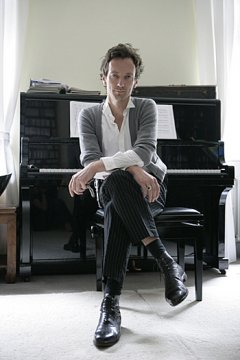Hauschka
Foreign Landscapes
Hauschka’s striking third album for FatCat’s 130701 imprint sees the pianist / composer making ambitious advances on his critically-acclaimed previous work. Stepping out from his established niche as a gifted and engaging ‘prepared piano’ player, he boldly extends his repertoire, resetting his music within a rich orchestral score. Nine of the album’s twelve tracks feature a 12-piece string and wind ensemble from San Francisco’s Magik*Magik Orchestra, alongside Volker Bertelmann’s own prepared piano. Dynamic, brimming with character and colour, ‘Foreign Landscapes’ retains its author’s distictive musical voice and leads the listener through a beautifully balanced collection, moving from delicate solo piano lyricism to a propulsive, robust minimalism. Now dark and intimate, now playful, now driving, the ensemble’s fleshed-out instrumentation enables Hauschka to bring his exuberant versatility to a vital new level. With ‘Foreign Landscapes’, Hauschka stretches for - and reaches - stunning new realms.
Hauschka is the alias of Düsseldorf-based Volker Bertelmann, who signed to FatCat’s 130701 post-classical imprint in 2007. Having studied classical piano for ten years, his work as Hauschka is based upon an exploration of the possibilities of the 'prepared' piano. Creatively undermining the preconceived idea of the piano as a pure-toned, perfected instrument waiting for a gifted virtuoso to play on it, Bertelmann instead modifies it by placing an assortment of material (gaffa tape, kitchen foil, felt wedges, bottle tops, ping pong balls, guitar string, etc) within its innards. What results are vivid, unconventional pieces made in a spirit of playful research-enthusiasm. As precised by Mojo magazine, “The sounds Bertlemann creates with(in) a piano are nothing short of astonishing.“Two well-received albums (2007’s ‘Room To Expand’ and 2008’s ‘Ferndorf’) backed by an engaging series of live shows have seen the artist’s profile steadily rise. Where the previous album comprised mostly solo piano recordings (with a few electronic and instrumental overdubs), ‘Ferndorf’ was a far more expansive album, also featuring a string duo, enabling an increased solidity. ‘Foreign Landscapes’ marks the next big step forwards.
Having initially been accompanied by the Magik*Magik Orchestra at a concert in their home town, Volker admired the way they responded to his music and soon formed the idea to transpose his predominantly piano-based music into a richer, more expansive sound-world. He began writing music for strings, clarinets and trombones in December 2008, and a completed score was recorded with the orchestra by Ian Pellicci at Tiny Telephone Studio in San Francisco in January 2010. All piano parts were subsequently recorded at Studio Zwei in Düsseldorf. Whilst the majority of the album is orchestral, it does not mark a complete break with its predecessors. In order to break up the overarching orchestral sound, Volker created several quieter piano pieces, as well as integrating some sparse, percussive prepared piano within a number of the ensemble pieces.
Where Hauschka’s breakthrough previous album, ‘Ferndorf’, was conceptually anchored by childhood memories and the rural village in which he grew up, the music on ‘Foreign Landscapes’ is framed by travel and seeks a sense of grounding via snapshots of a shifting series of diverse locations visited in a period of continual touring around the world. Within this constant recent rootlessness, the discovery of and attachment to these places marks them out as little islands of comfort or interest, locations that have left an enduring impression.
Most of the tracks take their titles directly from real locations. Thus, ‘Alexanderplatz’ comes from the famous square with the iconic television tower in the former East Berlin; ‘Mount Hood’ takes its name from a beautiful mountain in Portland, OR; ‘Madeira’ is the island where Volker found himself happily stranded for three days after a concert; ‘Union Square’ is that rare oasis of space in the middle of Manhatten which is otherwise extremely narrow and choked with high buildings; ‘Sunny Mission’ comes from Mission Street in San Francisco; ‘Konseiji’ takes its name from a buddhist temple in Kanazawa where Volker played; ‘Kamogawa’ comes from the river in Kyoto along which Volker walked one night.
Elsewhere, ‘Iron Shoes’ is “a symbol of being unable to move, of being stuck, which i have sometimes when i arrive in big cities... i need time to adjust to the rhythm by standing still”; ‘Children’ recalls “the power of children when they’re running around, playing without any sense of time. They bring a completely different intention into a room, square or building and I like this a lot”; and ‘Trost’ translates as ‘consolation’ or ‘comfort’: “I felt in the last year that I got a lot of solace whilst on the road and needed friendship. In a beautiful place like the ones described above you can find some peace and consolation, because the place connects you with the world and treats you well.”
Hauschka will be touring extensively in support of ‘Foreign Landscapes’.
